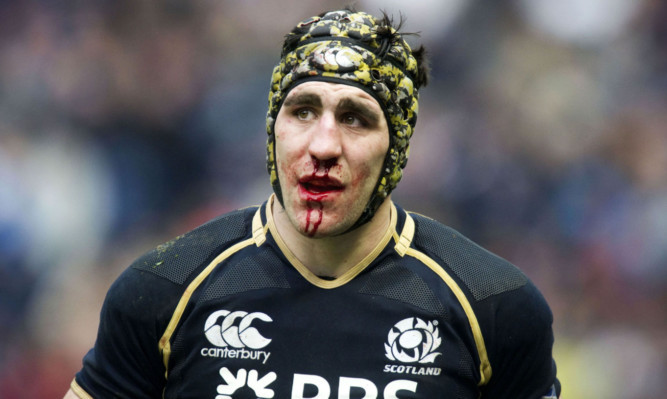Just how bad have Scotland been in the RBS 6 Nations in recent years?
This has not been the only time Scotland struggled in the championship. The early 1950s and the late 1970s were just as bad.
Only now we’re actually at the cusp of being worse, possibly even than the 1950s run of 17 successive losses. Scotland’s rate of “success” in the 6N is dropping alarmingly every year.
Since the championship extended in 2000, the Scots have won 19 and drawn two in 80 games, a success rate of 25 per cent.
In the past ten years, the rate is slightly down to 23 per cent; 12 wins (half of them against Italy) and a draw in 55 matches. Since 2010, however, it’s just 18 per cent, five wins and a draw (three wins against Italy) in 30 matches.
These are depressing figures but not exactly surprising; anyone who has been watching casually knows Scotland haven’t won many games in the championship recently. But when you go into specific player records, the figures get even more worrying.
Chris Paterson has the most losses of any non-Italian player in Five/Six Nations history, 37 in all. But “Mossy”, who made his Scotland debut in 2000, actually had a pretty reasonable success rate of 30 per cent. Yes, that’s reasonable compared to most in this era.
When you get down to the modern, still active players, it starts getting downright shocking. Scotland’s current captain Greig Laidlaw has been on the winning side in just three 6N matches. Geoff Cross has won three as well. Jim Hamilton just five, Ross Ford and Chris Cusiter only eight.
All of these players have been on the winning side in 20 per cent or less of their 6N matches. Ford and Cusiter have played 40 matches in the championship.
The last Scotland player to play more than 30 times and win more 6N games than he lost? Craig Chalmers, would you believe, with 17 wins and a draw in 32 appearances.
In the light of Scotland’s latest 6N whitewash, there’s been a groundswell calling for former captain Kelly Brown to be restored to the team, as well as John Barclay. They’re playing well for their club teams, and we’re missing leaders, appear to be the main arguments.
Brown and Barclay have been roundly ignored by head coach Vern Cotter since he took over. The Kiwi’s not publicly closed the door on them, but privately it seems he has. With back row injuries there was an opportunity to recall both during the 6N and it didn’t happen.
The reason? Cotter and forwards coach Jon Humphreys simply believe they have better options. They think that Blair Cowan, Adam Ashe, David Denton and Rob Harley are faster, better at lineout and better ball-carriers than Brown and Barclay, while as good in defence, stealing ball and industry as the two veterans.
If this was a heinous lack of judgement by the coaches I could understand the clamour, but it’s simply a selectors’ call, and at best a borderline one.
Which leaves leadership. Kelly has captained Scotland 14 times in his 64 internationals, and in many ways he was perfect; an unflashy, industrious player who led by example and conquered his stammer through the public demands of the role. John never captained any team in senior rugby in his time in Scotland.
Their personal 6N records? Kelly has won seven times in 31 matches and as captain, his record is two wins out of eight. John has been on the winning side in just three out of 21 matches.
Of course, these players are not entirely responsible for the defeats they endured. But you’d think, wouldn’t you, that if this leadership thing was so strong with them, their records would be just a little better?
Kelly’s last three matches as captain were the losses to Ireland, France and Wales in the last Six Nations, when Scotland were by some way worse than they were during this whitewash.
If it’s proven leadership you’re after, then let’s recall Al Kellock. The veteran Glasgow Warriors captain has the best success rate of modern, active Scotland players at 33 per cent. Nobody’s suggesting this, for some reason.
The idea that you should solve Scotland’s culture of losing by going back to players who were in the losing teams that got us here seems to me to be perverse. The only way you can define leadership is in the win column; there’s no other measurement.
Scotland are in a process of transition – a seemingly perpetual transition maybe, but the young players in the team now have talent, everyone agrees.
I don’t think we have any choice but to have faith in them to grow, launch a new culture and become the leaders of a winning team.
